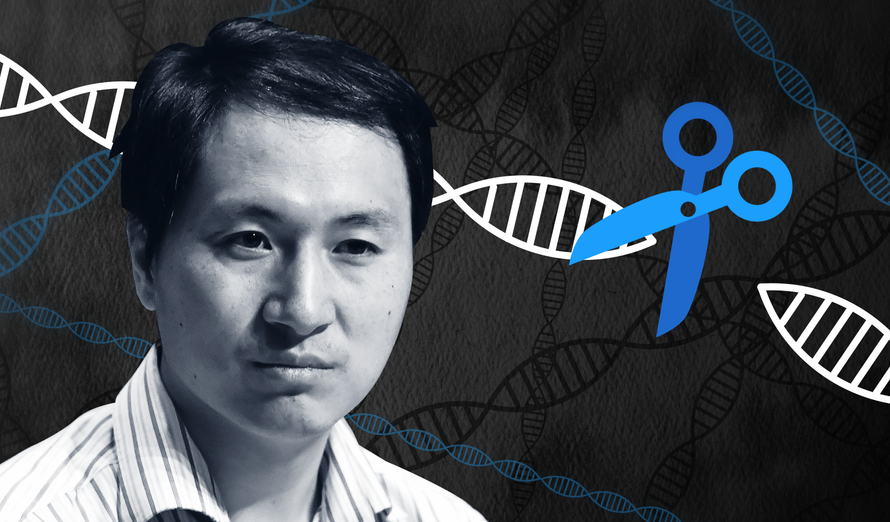A pair of Chinese twins who were gene-edited for resistance to HIV may also have ‘supercharged’ brains, along with possible resistance to age-related cognitive diseases such as Alzheimer’s.
In a controversial experiment led by Chinese scientist He Jiankui, the embroys of seven couples had their genes “edited” using a tool known as CRISPR. By removing a gene called CCR5, Jiankui sought to create a natural immunity to HIV – which requires CCR5 to enter blood cells.
Based on new research, however, Jiankui may have also left the twins, Lulu and Nana, with improved memory and enhanced cognition, according to MIT Technology Review. They may also enjoy some degree of protection from Alzheimer’s Disease and other maladies which are rapidly being linked to chronic inflammation, as some groups of mice without CCR5 – or who have been given CCR5 inhibitors, experience less severe dementia or Alzheimer’s symptoms.

“The answer is likely yes, it did affect their brains,” says UCLA neurobiologist Alcino J. Silva, whose lap discovered a link between CCR5 and the brain’s ability to form new connections.
“The simplest interpretation is that those mutations will probably have an impact on cognitive function in the twins,” says Silva, adding that the exact effect on the girls’ cognition cannot be predicted, which is “why it should not be done.”
Jiankui’s human experiments drew harsh rebuke after news of Lulu and Nana’s birth in late October or early November, and has reportedly been fired from his position at the Southern University of Science and Technology (SUSTech) in Shenzhen, China. Jiankui says there are more gene-edited babies on the way.
The experiment has been widely condemned as irresponsible, and He is under investigation in China. News of the first gene-edited babies also inflamed speculation about whether CRISPR technology could one day be used to create super-intelligent humans, perhaps as part of a biotechnology race between the US and China.
There is no evidence that He actually set out to modify the twins’ intelligence. MIT Technology Review contacted scientists studying the effects of CCR5 on cognition, and they say the Chinese scientist never reached out to them, as he did to others from whom he hoped to get scientific advice or support. –MIT Technology Review
In 2016, Silva and professor Miou Zhou of the Western University of Health Sciences in California showed that removing the CCR5 gene from mice significantly improved their memory. Moreover, ” Silva and a large team from the US and Israel say they have new proof that CCR5 acts as a suppressor of memories and synaptic connections,” according to the report.
According to their new report, appearing in the journal Cell, people who naturally lack CCR5 recover more quickly from strokes. What’s more, people missing at least one copy of the gene seem to go further in school, suggesting a possible role in everyday intelligence. –MIT Technology Review
“We are the first to report a function of CCR5 in the human brain, and the first to report a higher level of education,” said UCLA biologist S. Thomas Carmichael – who led the study.
Silicon Valley wants in on it
Silva tells the MIT Technology Review that “because of his research, he sometimes interacts with figures in Silicon Valley and elsewhere who have, in his opinion, an unhealthy interest in designer babies with better brains.”
When word of Jiankui’s experiment went public, Silva says he immediately questioned whether enhanced cognition was the real goal of the experiment.
“I suddenly realized—Oh, holy shit, they are really serious about this bullshit,” said Silva. “My reaction was visceral repulsion and sadness.”
He Jiankui acknowledged that he knew about the potential cognitive benefits of removing the CCR5 gene discovered by the UCLA team during a Q&A session, though he said “I am against using genome editing for enhancement.”
The benefits of CCR5 removal are currently being tested on both stroke patients and people with HIV-induced memory issues.
In those studies, one of which is under way at UCLA, people are being given an anti-HIV drug, Maraviroc, which chemically blocks CCR5, to see if it improves their cognition.
Silva says there is a big difference between trying to correct deficits in such patients and trying to create enhancement. “Cognitive problems are one of the biggest unmet needs in medicine. We need drugs, but it’s another thing to take normal people and muck with the DNA or chemistry to improve them,” he says. “We simply don’t know enough to do it. Nature has struck a very fine balance.” –MIT Technology Review
“Could it be conceivable that at one point in the future we could increase the average IQ of the population? I would not be a scientist if I said no. The work in mice demonstrates the answer may be yes,” said Silva. “But mice are not people. We simply don’t know what the consequences will be in mucking around. We are not ready for it yet.”
via ZeroHedge News https://ift.tt/2tC0BwU Tyler Durden
